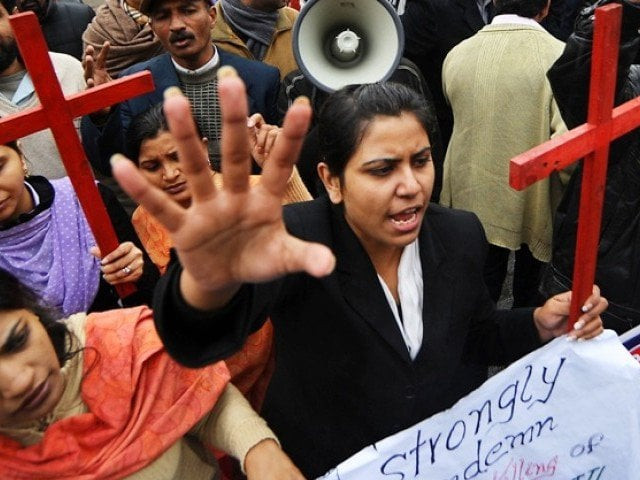Faith-based violence used by groups to mask economic motives behind crimes
Consultation on faith-based violence held

File photo of Christians protesting. PHOTO: AFP
“Minority communities are marginalised by masquerading personal matters as religious issues,” said Jalila Haider, a representative of We the Human.
“This has resulted in arson in neighbourhoods, target killings and displacement of scores of families,” she said.
Haider was representing the Hazara community from Quetta. She discussed faith-based discrimination in Balochistan.
“Ever since Kalbhashan Yadav, a RAW agent, was arrested from Quetta, the Hazara community has been suffering because of the language they speak. Law enforcement personnel associate any Persian speaker with Iran.”
She said every society should take responsibility for mistakes made in the past. “Shias sided with the state when Ahmadis were declared non-Muslim. On behalf of my community, I would like to apologise to representatives of Jamaat-i-Ahmadyyia present at the conference for this mistake,” she said. Ali Ahmed Jan, a representative of Ismaili community from Gilgit, supported her views. “Money matters are depicted as religious conflicts,” he said. He said inclusive education could pave the way for a tolerant society. “The curriculum should be reviewed and revised,” he said.
Amir Mehmood, a representative from the Ahmadi community, said his community had been distrusted since the inception of Pakistan.
“Because of the segregation imposed by the state, Ahmadis have been unable to participate in the political processes. We cannot even protest our humiliation.”
“We cannot call our place of worship a mosque or greet people in the traditional manner,” he said.
Mangla Sharma, a representative of the Hindu community, said before General Ziaul Haq’s rule, the status of her community was not as bad as it was today.
“I could take Islamiat classes with my Muslim friends at school,” she said.
“But in 1980s, the regime used religion to prolong its rule apparently without any thought of its consequences for future generations of this country,” she said.
In his keynote address, HRCP general secretary IA Rehman said after the Partition of 1947, temples and gurdawaras were used as refugee camps.
“They were not returned to their custodians,” he said.
He said many temples were razed following the demolition of Babri Masjid in India. He said there should be a mechanism to collect information about attacks or encroachments on religious places of minorities. He said the state should protect minorities. Journalist Ejaz Haider, Mubarik Ahmed, rights activists Peter Jacob, Joseph Francis, Mehboob Ahmed, Sayed Muhammad Ashraf, Naeemul Haq, Cecil S Chaudhry and Aroon Kumar Kundnani also spoke on the occasion.
Published in The Express Tribune, May 20th, 2016.



















COMMENTS
Comments are moderated and generally will be posted if they are on-topic and not abusive.
For more information, please see our Comments FAQ